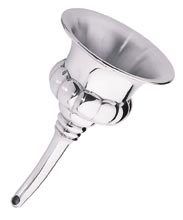Shoppers Increasingly Turn to Manufacturer and Editorial Content Sites to Research New Vehicles - Pricing and "Buying Sites" Decline
 In-Market Funnel |
WESTLAKE VILLAGE, Calif., Oct. 10, 2006 -- New-vehicle buyers are relying more on manufacturer and dealer Web sites throughout their shopping process at the expense of portals and many independent Web sites, according to the J.D. Power and Associates 2006 New Autoshopper.com Study(SM) released today.
The study, which measures the shopping habits of 28,989 actual new-vehicle buyers, has shown a shift in the focus of online vehicle shopping over the years from finding the right vehicle price to finding the right vehicle. A record high of 87 percent of automotive Internet users (AIUs) are visiting at least one manufacturer site, and they are visiting a greater number of them. By comparison, only 77 percent of AIUs visit an independent automotive Web site -- down from the 2004 peak of 80 percent.
"Generally speaking, the independent Web sites that shoppers find extremely useful are increasing in visitation or at least holding steady," said Dennis Galbraith, executive director of digital marketing solutions at J.D. Power and Associates. "However, consumer expectations are increasing faster than many independent Web sites are improving. The result is lower satisfaction ratings for relatively stagnant sites in terms of new content and less visitation by actual buyers. Instead, consumers are visiting several manufacturer sites during the shopping process to gather the information they need."
The automotive sections of large portals all experienced significant declines in site visitation from 2005, although Yahoo! Autos remains one of the industry's most visited automotive Web sites. Some of the better-known shopping sites of the past, such as CarsDirect.com and Autobytel.com, are steadily declining in site visitation by actual new-vehicle buyers. At the same time, some of the most visited shopping sites, including AutoTrader.com, cars.com, Consumer Reports.org, Edmunds.com, and Kelley Blue Book's kbb.com are helping shoppers find the right vehicle and are attracting as many or more new-vehicle buyers than ever before.
"Many independent sites start by asking the shopper 'what make and model are you looking for?' in exchange for pricing information," said Galbraith. "The problem is that many shoppers need help determining which vehicle is right for them. Shoppers know that first-year depreciation is going to cost them many thousands of dollars. They know how important it is to buy the right vehicle -- one that is going to meet their needs for some time to come. The cost of buying the wrong vehicle is generally far greater than the cost of poor negotiating. It is not a surprise that shoppers are moving away from sites that want to turn them into request-for-quote leads with little or no help offered to find the right vehicle."
The study finds that shoppers are relying more on manufacturer Web sites for vehicle information, commonly visiting a number of manufacturer sites before they buy. Among AIUs, 74 percent rely on manufacturer sites the most for options and features information -- the highest percentage yet recorded.
With a record 67.5 percent of new-vehicle buyers using the Internet in their online shopping process, visitation to vehicle brand Web sites has become extremely important to manufacturers' marketing efforts. The study finds that online shoppers who visit a brand site are far more likely to purchase that brand than are AIUs who do not. However, the site's impact on the shopper's vehicle choice is not the only variable impacting this relationship. Vehicle image as well as online and offline advertising remain important. If the desire for the vehicle is strong enough that the brand site is the first site visited, the chance of that brand getting the sale roughly doubles.
Brand Market Share by Visitation to Brand's Site
Brand Site is the Brand Site is Brand Site Not
First Site Visited Visited, But Not First Visited by AIUs
Chevrolet 64% 26% 2%
Dodge 79% 22% 1%
Ford 62% 19% 1%
Honda 72% 29% 2%
Nissan 69% 26% 1%
Toyota 67% 30% 2%
Based to AIUs not adding/replacing the same brand.
Using large, non-premium brands as an example, the above chart demonstrates the dramatic change in the brand's market share among AIUs who visit that brand's site first (left column), visit that brand's site after another site was visited (center column), or did not visit that brand's site at all (right column). For example, among AIUs who are not adding or replacing a vehicle of the same brand, 64 percent who visited the Chevrolet site first ultimately purchased a Chevrolet. That percentage drops to 26 percent if they visited the site, but not first, and just 2 percent of AIUs who didn't visit the site at all ultimately purchased a Chevrolet.
"Getting a shopper interested enough in a vehicle to visit the site at the beginning of the shopping process can dramatically impact a brand's market share among automotive Internet users," said Galbraith. "This demonstrates the dynamic importance of manufacturer sites and challenges each brand to stimulate demand for its vehicles before consumers begin actively shopping and to attract shoppers to their sites once the shopping process has begun."
About J.D. Power and Associates
Headquartered in Westlake Village, Calif., J.D. Power and Associates is an ISO 9001-registered global marketing information services firm operating in key business sectors including market research, forecasting, consulting, training and customer satisfaction. The firm's quality and satisfaction measurements are based on responses from millions of consumers annually. J.D. Power and Associates is a business unit of The McGraw-Hill Companies.


